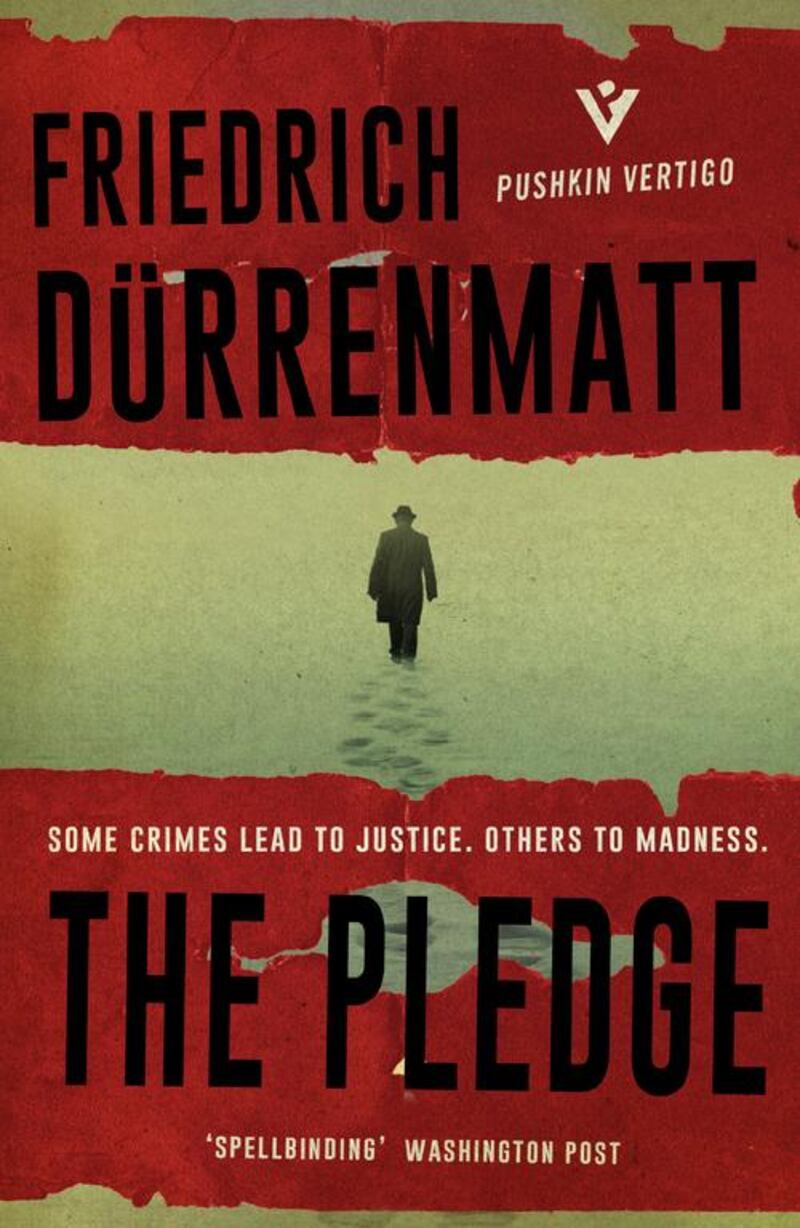The body of a girl is found in woods outside “a little hole in the wall” Swiss village. Matthäi, an inspector in the Zurich cantonal police, is reluctant to take on the case: it is his last afternoon in the job and one of his last days in the country before he embarks on an overseas posting in Jordan. Nevertheless, he begins to investigate and is soon drawn in to a mystery which confounds him, then consumes him and ultimately breaks him.
On the surface, the case seems clear-cut. The peddler who discovered the body carried around the murder weapon – razors – and had blood stained clothing. He also has a previous conviction for molesting a girl. Despite vehemently proclaiming his innocence, he is ground down in a 20-hour interrogation, and at the end of it confesses to the crime. The following day he hangs himself in his cell.
Case closed. Only Matthäi still has doubts. And as this was the third infanticide of its kind in recent years he feels compelled to make sure the killer is not still at large and prepared to strike a fourth time. He stays in Switzerland, leaves the force and devises a “devilish scheme” to pursue a new suspect privately – and obsessively.
Swiss-born Friedrich Dürrenmatt (1921-1990) was one of the most celebrated German-language writers of the 20th century, adept at both politically-charged plays and philosophically-minded thrillers.
The Pledge: Requiem for the Detective Novel, his dark and gripping tale from 1958, remains his most famous novel. Its appeal lies in its ability to intrigue and unsettle. Joel Agee's skilful translation conveys the horror of a brutal crime, the fear and anger that engulf a community, and the feverish determination of a man on a high-stakes hunt.
Dürrenmatt’s murky tones and textures are there from the beginning. Instead of clean vistas and chocolate-box chalets he sets scenes composed of desolate landscapes, filthy taverns and miserable gas stations. Cigarette butts float in puddles of melted snow. Mist rises over snowfields “like an evil spell”. Surrounding mountains are not majestic – “they rather resembled heaps of earth, as though someone had dug an immense grave”. Dürrenmatt informs us that “Everything was densely quiet, but menacing,” and this atmosphere prevails until the novel’s bitter end.
A chink of light trickles in when Matthäi makes his “pledge” to the dead girl’s mother, swearing by his eternal salvation to track down the perpetrator. However, his optimism is misplaced and his unconventional methods to lure and entrap come to look like desperate measures.
In time, those around him wonder if he is on the lookout for a murderer who doesn’t exist and, consequently, gradually taking leave of his senses. “He wanted reality to conform to his calculations,” one commentator says. “Therefore he had to deny reality and end in a void.”
But it is Dürrenmatt who ends in a void by opting for a tradition-breaking denouement. Raymond Chandler once wrote that if the detective fails to solve the crime then the story is “an unresolved chord”. Dürrenmatt disagreed. For him, the detective novel was not a chess problem or a mathematical puzzle that had a neat, topped-and-tailed resolution. The ending should be messy or up in the air, reflecting the chaos, absurdity and unfairness of real life.
In The Pledge he has one of his characters voice his frustration with the genre's rigid format: "This fantasy drives me crazy. You can't come to grips with reality by logic alone." We are then propelled towards an original – and daring – conclusion in which chance plays a bigger role than deduction.
The book's subtitle, Requiem for the Detective Novel, hints at Dürrenmatt's dissatisfaction with the constraints of the form. And yet his playful inventiveness and his wilful rule-breaking show that the genre was not as moribund as he claimed it to be. Indeed, with his metafictional tricks and metaphysical inquiry, Dürrenmatt reinterpreted the detective novel and pushed it in a new, postmodern direction, passing the baton to the likes of Umberto Eco and Paul Auster.
The Pledge has spawned several movies, perhaps the most famous of which was the 2001 Hollywood film directed by Sean Penn and starring Jack Nicholson. But it is this spare yet potent book which conjures the most striking magic, entrancing with its chills, shocks, artful delights, and even surprise lyrical wonders: "Our rational mind casts only a feeble light on the world. In the twilight of its borders live the ghosts of paradox."
Malcolm Forbes is a freelance reviewer based in Edinburgh.










